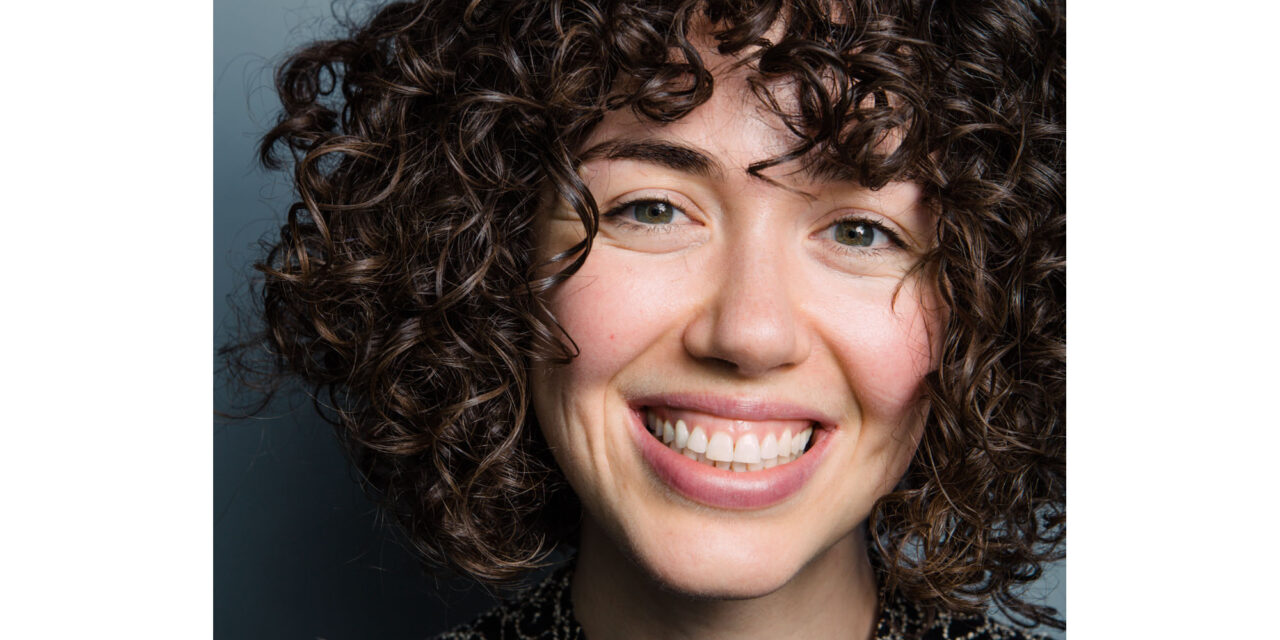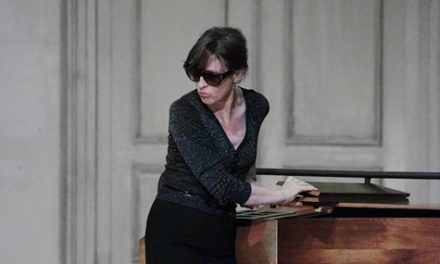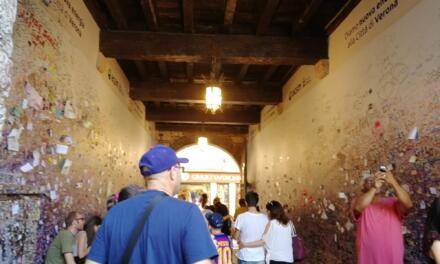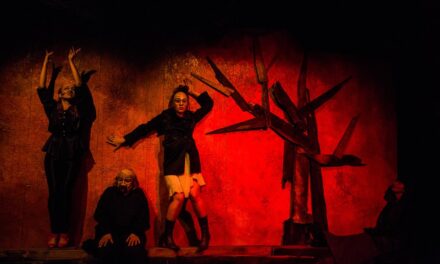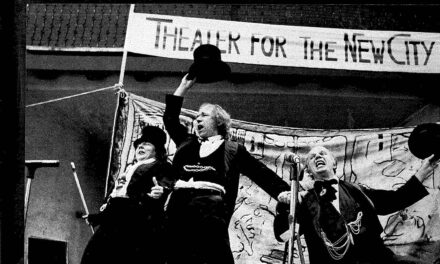Director Aoife Spillane-Hinks has quite the origin story for her entry into theatre. As the story goes, her mother was a theatre critic in New Haven, Connecticut when a babysitter cancelled on her last minute. Still needing to do her job she explained to the three-year-old Aoife that she would need to be very well behaved. The show just so happened to be an Irish touring production of Waiting for Godot and Aoife loved it and so her mother brought her along to shows she reviewed thereafter.
Having an Irish passport through her mother, she moved to Ireland to do her masters at NUI Galway in Drama and Theatre Studies. Ireland seemed like a good place for a young artist, due to social welfare programs and overall support for the arts here. Nearly 15 years later, she’s established herself with her company Then This Theatre, having worked with Abbey Theatre, Gate Theatre, Project Arts Center, Axis Ballymun, and many more.
As we began our conversation I jokingly asked if the Irish get confused by her very Irish name and then hear her very New England accent. Of course, just as she said it was nice not having to spell her name or tell folks how to pronounce it, the postman rang at the door asking for “Aoife”.
“See, even the postman knows how to say your name,” I quipped.
The following is an edited and condensed version of our conversation.
Ashley Steed: In an interview that you did this summer, you talked about how you were really lonely when you first arrived, which really spoke to me. I was also incredibly lonely during my masters in London, and of course now with moving to a new country during a pandemic. I’m curious about how that impacted your first few years here.
Aoife Spillane-Hinks: Well, I mean, it’s interesting because on the one hand, it was really tough. But, you know, with friendships – it wasn’t as if they were completely absent, but there was a lot of time when I couldn’t really count on that part of my life to kind of be in place. So, that was definitely tough but I suppose it also was a time when I was able to cultivate certain parts of my relationship with myself. That first year, I remember I lived in a house that didn’t have internet. I had all of this time to read, and to write in my journal, and to do a lot of work with food and lots of stuff like, and just spend time, quiet time on my own. I feel like, ultimately, that kind of thing does really stand to you. But it only stands to you and is only valuable and awesome when you’re looking back on it, you know. In the middle of it you’re just like, is this going to mean anything?
Steed: Yeah, that “What am I doing with my life?” phase. You’ve also talked about how when you were first starting your theatre career in Dublin, you didn’t have to pay full rent and had the rest subsidized by the government. I know one reason why [my partner] wanted to move back and settle down in Ireland was because of the social safety nets here. So, I’m just curious about how you feel like that [safety net] shaped you as an artist. And if you’ve ever thought about what it would have been like if you had stayed in the States.
Spillane-Hinks: Well, I think one of the big things is, and this is not true of everybody, but I feel like there’s been less of a drain physically and energetically on me at a lot of different times when I’ve [not had paid theatre work]. Also, there have been a lot of opportunities to teach in third level or to do other kinds of work that might not be exactly directing plays, but is very much adjacent and is very much, not only using the skills that I have, but still allowing me to grow.
There’s a headspace that you get when you don’t have that pressure to be working a really large job that’s not connected to the arts. On top of trying to do your artistic work and figure out where all that’s going. Again, as I said, I know that there are people who do end up needing to take on other [non-arts] work. I think as a director it’s a slightly easier position than for actors. Because, not that actors don’t have transferable skills, but sometimes people who might be hiring can more easily translate a director into other roles, than an actor. Also directing and teaching can be that thing that feels much more similar than acting to teaching. As you know, compared to how things can be in the States, people just take it for granted that the arts are a part of normal life here.
Steed: I’m curious, jumping ahead to Covid, were working on something when Covid hit?
Spillane-Hinks: I was lucky because I have a number of friends who were in rehearsal for something that never got to open. I was going to be starting rehearsals, in about a month after [Covid shut down theatres], for a revival of a show that I had done already. It would have been nice because it was going to be a revival in the Gaiety Theatre which is a really lovely beautiful historical theatre, and it would have been a lovely step up for the show.
Steed: Which show was that?
Spillane-Hinks: A show called Holy Mary [by Eoin Colfer] which is about two little girls in inner-city Dublin, who are making their first communion. It’s a really beautiful show and I find it very important. It’s very simple, and it’s very sweet and very uplifting, but it’s also incredibly rich in terms of what it says about what people can do with very little. It makes a really interesting argument for the place of… not religious education, but spiritual education. It’s about Catholicism and first communion, but it’s very much about children reckoning with moral decisions; and when it’s not toxic, something like a Catholic upbringing can provide a structure within which children can have those kinds of conversations.
John Gunning, who’s a designer, had started doing some live-streamed play readings. So I said to the gang, who had been involved with Holy Mary, “why don’t we get in touch with John and do a live-streamed reading of the play at least?” They were very much on board. It was really nice to be able to touch in with that even though we weren’t able to do the full show.
Steed: I imagine everything else was completely canceled as well.
Spillane-Hinks: Yeah, but I feel like I was really lucky in a couple of ways. First of all, my husband is a surgeon, so he was still going to work every day. So on a really basic level, my home life had a pretty normal structure to it, because there was somebody who was waking up at a normal time, going to work, coming home, having dinner. That kind of gave me a structure, even though I didn’t have one myself. And we live in a house. We have space, and we have a back garden and we have a park that’s three minutes away by foot. We have cats. I feel like mental health wise I had a lot of things that were enabling me to be relatively resilient.
I work as a teacher and I also do individual coaching. So I put it out on Twitter and on Facebook and Instagram that I was doing “pay what you can” coaching for a month or two. I had that engagement going on from a relatively early point in the pandemic as well, which again was incredibly helpful to me. Sort of just giving that sense of purpose and context, just as we lost so much of both of those things.
Steed: Yeah purpose. I’ve been struggling a lot with that and feel like I’ve been floundering. For me personally, the pandemic has hit my creativity and drive like I’ve never experienced before. I’m curious if it did hit your creativity at all or if there was any floundering for you.
Spillane-Hinks: I haven’t really found that, to be honest. I’ve spoken about this with a couple of friends who are similar. I am an introvert and I’ve found that I’ve spent a lot less energy on things that are really energetically toxic. I often find it very difficult to quiet my mind. One thing that a friend of mine articulated early on in the pandemic was how much more quiet you could actually experience because you were literally having fewer interactions. I don’t say like, “hurrah thank goodness for Covid!” but I have found personally that there are ways in which I have actually more in my reserves. And where I’ve been able to listen to my own instincts. And my own needs, in a way that I can often have a lot of other radio waves coming into, and find it more difficult to navigate.
Steed: Yeah, I agree – our lives as freelance artists, it’s hustle hustle hustle, go go go go go, next project next project next project. What are you hoping in a post-pandemic world to carry with you from what you’ve learned from this time?
Spillane-Hinks: A couple of things. One of them is, we’ve all learned different ways to do things that we used to think could only be done in one way. I’ve heard several different practitioners with different kinds of disabilities or different access issues talk about the fact that all these meetings that they were always told they had to find a way to get to in person, are suddenly all happening online now.
With Comfort and Joy, for instance, the rehearsals that we did were relatively low key. Those realistically could be done on zoom, because it’s a relatively physically static piece. So, for me to ask of a performer, can you get on zoom with me for 90 minutes so we can read through the piece, have a bit of a chat and give you some feedback as necessary. It’s a lot less to ask the performer who is in Wicklow, who doesn’t have a car to figure out how to get from Wicklow up to Axis in the north side of Dublin.
I think that there’s a way in which we make the lives of freelance independent theatremakers a bit more sustainable by saying, rather than having to schlep across town for something that’s relatively limited that we need to do together, but we actually don’t necessarily need to be together to do physically, [especially] if we’re talking about text. I’ve done a couple of script workshops on new plays, and last week I did a pretty compressed script workshop, and we did a rehearsed reading for something that was sent out over YouTube. The team that we had for last week’s project there was someone in Athens, someone in Egypt, someone in Berlin, someone in Belfast, and then four of us in Dublin. And they were all Irish artists who just happened to be other places. But again, those geographical limitations were broken down by the fact that it was not staging, it was about text, it was about building this sense of the characters and the shape of the text and everything that’s possible to a large extent.
I think there’s an element of that, that just being creative being flexible, taking moment to think, is physical presence together necessary, and sometimes it is and absolutely honor that. But there are other times when we can reserve the store of our energy or the money that it will cost to rent the space for that two hours or whatever, and actually are there ways for us to expend less of our resources and get the same work done over some medium like this [on Zoom].
Steed: I agree, it’s totally changed my viewpoint on that too. I really feel like there’s a future for employing technology in more accessible useful ways, so I think that’s a great thing for us to advocate for and carry forward.

Promo image for Comfort and Joy (pictured, clockwise from top left, are Ruth McGill, Barry McGovern, Maeve Fitzgerald, Kwaku Fortune).
Let’s talk about Comfort and Joy! I feel like is something that we all could use right now. I’m curious as to how that came about and tell me a little bit about the project and what to expect.
Spillane-Hinks: Comfort and Joy kind of started from a disappointing set of circumstances, which was that my company Then This Theatre was supposed to present our production of the Yellow Wallpaper as part of the Axis’s celebration of Halloween. So, Maeve Fitzgerald, my longtime collaborator and really close friend performs the piece, and she and I had started rehearsals for that when level three partial lockdown came into effect so theatres were closed down. Mark O’Brien who runs Axis and Aifric Ní Ruairc who does a lot of the programming work had said to me well listen, we can’t do this, why don’t you find some kind of offering for Halloween. They were going to have this online festival called Other Worlds which is a festival in Ballymun – it’s normally in person but it’s going to be online. So I went away and I came back with this whole idea of this program of spooky stories and songs and poems and monologues and all these things and they said, “This is great. This is way bigger than what we were talking about. Can you do this for Christmas?”
So I put together this largely Christmas, but [also] a seasonal winter program for people to watch from home, that might give them, as it says in the title, some comfort and joy. The first part of the process of figuring out what the piece is going to contain for me was really figuring out what the title was. I thought about it a lot and I thought about that line from “God Rest Ye Merry Gentleman.” That’s exactly what a piece needs to give to people right now. We need that comfort, that deep kind of humanity and kindness, and the feeling of safety, and we need a joy that is deep burning like a really well-made fire, that’s not going to burn out in a second. That kind of long positive energy that is going to get people through this time of year when there’s going to be celebration but they’re going to be limited, there’s going to be people you won’t be able to see, and everyone’s having to recover from the year that we’ve had in whatever way that that has impacted on any individual.
So I asked four performers to take part, Maeve [Fitzgerald] being one of them. And the other three performers are all people who, again, I felt would bring an excellence, talent, but also a great heart to it. So that again, this ability of the piece to make people feel comforted and joyful. Barry McGovern, who is one of our great living actors, his voice alone will fill you with the Christmas spirit. Early on in the process of putting together the ideas for the people and the pieces, Maeve sent me a text just saying, “Barry reading ‘Night Before Christmas’”. We recorded it last week. It’s so beautiful.
Kwaku Fortune, who is a wonderful actor, is someone who I’ve known for a good number of years. Again, he’s somebody who brings so much warmth, good humor, heart to the work that he does. There’s a connection that he can have with the audience that I knew that he would be able to bring through the camera into people’s homes and it was really important. And he’s got a really beautiful youthful energy.
Finally, Ruth McGill is our musician. She went above and beyond. I kind of said [let’s have] a handful of songs and she came back with I think nine beautiful arrangements and versions of the songs which she accompanies herself on, she plays guitar and sings. There is a kind of transformational quality to how she approaches music and the act of singing.
There is so much fun in having a bopping rollicking Christmas celebration. And that’s fantastic. But I wanted to give people a bit of a deeper slower burn of a sort of fire within with this. We’ve got some lovely classics that will bring people right back to a sense of Christmas or winter, and that kind of wonderful chill and then wonderful warmth of going inside from there. But then some real gems that I found along my way of searching like the beautiful Washington Irving piece about Christmas and about how people make the warmth inside because nature, it’s the one season when nature doesn’t give you the warmth and the beauty outside and a beautiful Hans Christian Andersen story about a tree growing old and learning the meaning of life. So it’s a mix of stuff that people will be familiar with and then other material that will be new to them. But all of it is very inviting, is very warming, all of it is family-friendly, so it’s something that I’d like people to be able to watch with people of all ages, in their homes. And hopefully, it’s something that would give people a little bit of, well, comfort and joy.
Comfort and Joy: A Winter Celebration is presented by Then This Theatre in association with axis ballymun and plays virtually December 10 and 11. For more information and for tickets visit Axis Ballymun.
This post was written by the author in their personal capacity.The opinions expressed in this article are the author’s own and do not reflect the view of The Theatre Times, their staff or collaborators.
This post was written by Ashley Steed.
The views expressed here belong to the author and do not necessarily reflect our views and opinions.

